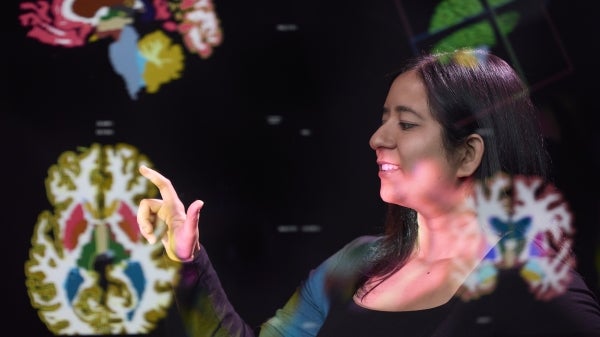Decision Theater enters 3rd era of decision-making support with new leadership

Decision Theater is now formally a part of the Julie Ann Wrigley Global Futures Laboratory and will be led by Manfred Laubichler, director of the School of Complex Adaptive Systems.
During what many scientists and scholars have described as the most decisive decade of our time for climate change and social justice outcomes, the decisions we make today are especially critical in shaping our future.
Since its inception in 2005, Decision Theater has been used by policymakers, community stakeholders, businesses and researchers to visualize and model complex data and forecast the impacts of potential actions to assist these decisions. Now, Decision Theater is gearing up to evolve their capabilities to meet the needs of this new era of decision-making around global challenges with a focus on model co-production through multi-stakeholder collaboration.
Under new leadership, Decision Theater is now formally a part of the Julie Ann Wrigley Global Futures Laboratory and will be led by Manfred Laubichler, director of the School of Complex Adaptive Systems. Previous director Jon Miller is transitioning to a new role with ASU’s Knowledge Enterprise.
This evolution of Decision Theater marks its third iteration and includes an updated mission statement: to transform decision-making for local and global challenges through the co-creation of data-based tools, methods and experiences that engineer curiosity, explore possible futures and empower societies to address complex issues.
“Thanks to Jon’s leadership through Decision Theater’s last phase, we have an organization at hand that can serve several important elements of ASU’s mission,” Laubichler said. “Through increased collaboration within ASU and with national and international partners, we plan to create a more agile, modular and creative framework for Decision Theater. This will allow us to better examine major local and global challenges ASU is addressing that have a decision-making component.”
As a decision support resource, Decision Theater integrates data sets across multiple complex systems and perspectives, and it uses advanced computational forecasting to model them in ways that empower the exploration of possible futures. They recently demonstrated this capability at the Rob and Melani Walton Center for Planetary Health during this year’s Earth Day celebration, providing audience members the opportunity to explore a model about where to locate new solar power plants across Arizona.
In this interactive exercise, audience members were able to vote among multiple potential sites, see the top two locations run through the model and collectively weigh the pros and cons of each location. As with most challenges facing our society, there was no perfect option — but that was the point.
Choices around complex issues involve both intended and unintended consequences, which require awareness and deliberation. Through the demonstration, audience members experienced firsthand how tools created by Decision Theater make these impacts and trade-offs visible to empower better decision-making and provide awareness for anticipated cons to be mitigated.
“When Decision Theater launched in 2005, it was a cutting-edge tool to connect researchers and policymakers to see the effects of potential strategies,” said Peter Schlosser, vice president and vice provost for Global Futures and acting dean of the College of Global Futures. “As part of the Julie Ann Wrigley Global Futures Laboratory, we will build on Decision Theater’s exceptional history and further its mission to support science-informed policy through increased accessibility and augmented intelligence that can produce results anywhere in real time.”
As Decision Theater evolves under new leadership, all existing projects will continue to completion, even as others are added to their portfolio. Going forward, they will continue to provide decision support tools at a larger scale and will begin engaging more in the academic space offered at ASU to publish research and contribute to decision science.
More Science and technology

How ASU is reshaping manufacturing training
The manufacturing sector faces a persistent challenge: a shortage of skilled workers.As industries adopt emerging technologies,…

Podcast explores the future in a rapidly evolving world
What will it mean to be human in the future? Who owns data and who owns us? Can machines think?These are some of the questions…

New NIH-funded program will train ASU students for the future of AI-powered medicine
The medical sector is increasingly exploring the use of artificial intelligence, or AI, to make health care more affordable and…